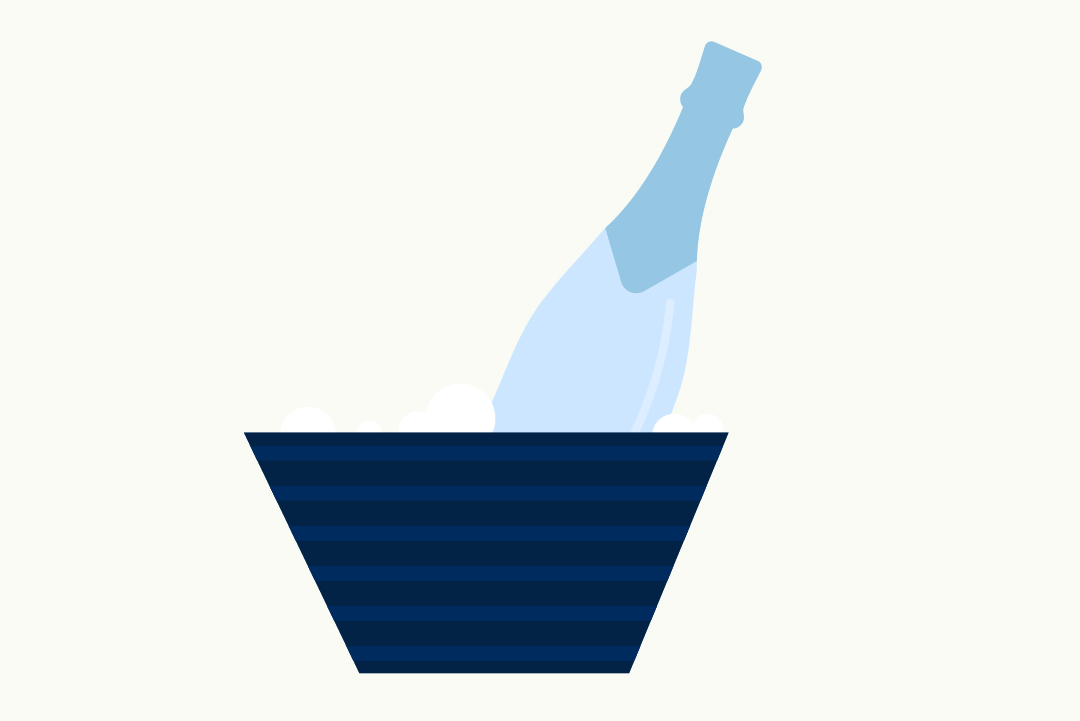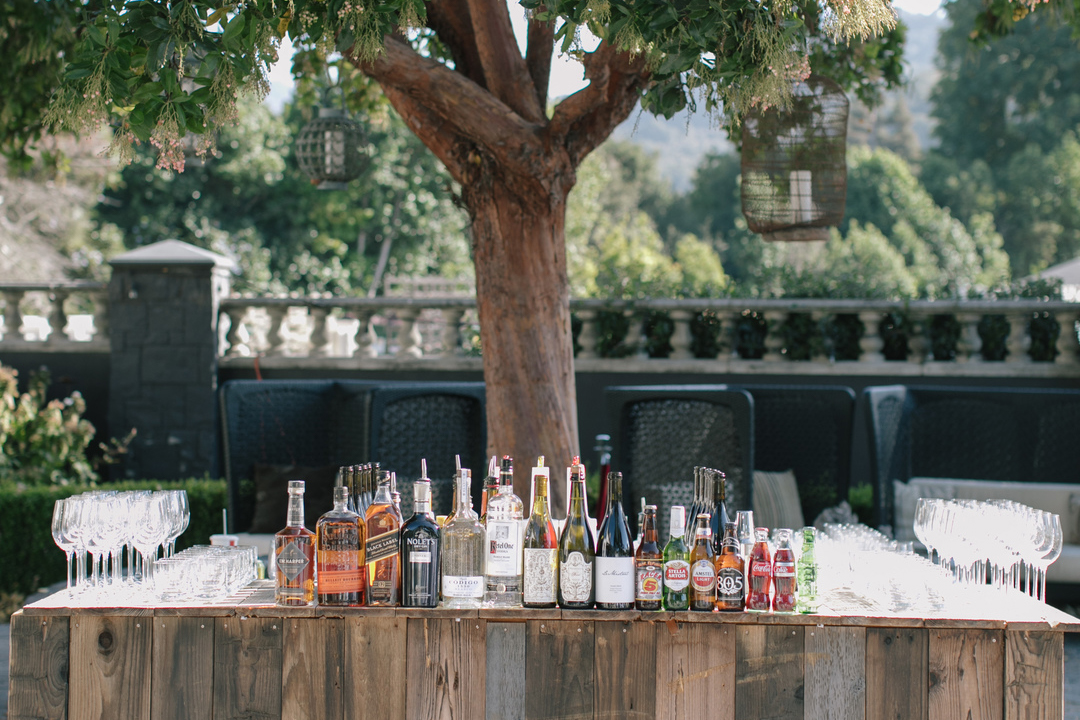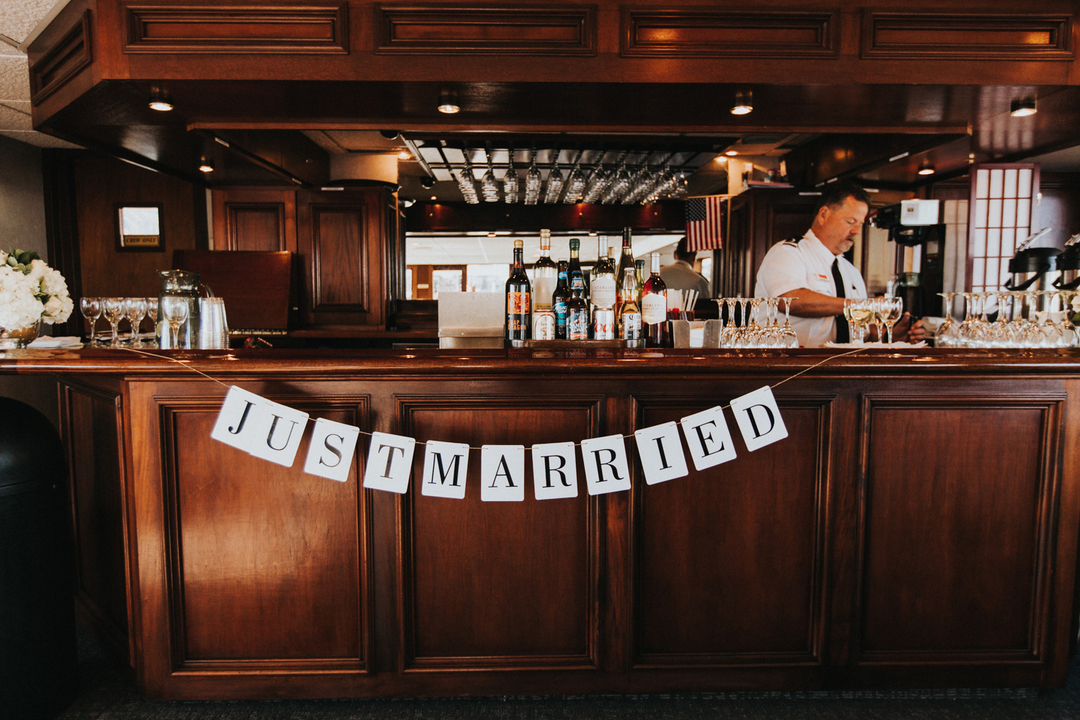- Expert advice/
- Wedding planning 101/
- Wedding planning questions/
- How to Buy Alcohol for Your Reception
- Wedding planning questions
How to Buy Alcohol for Your Reception
Buying alcohol for your reception can save you money—if you do it right. Find out exactly how much beer, wine, and liquor to buy for your celebration with our guide.
Last updated February 5, 2024

There are a few reasons you may forgo hiring an alcohol vendor at your wedding—the main one, though, is to save money. Without a vendor you may skip out on paying premium prices and upcharges, plus you may not have to pay any service charges. It sounds ideal, but buying alcohol for your own reception can take a turn—financially and stressfully—if you don’t plan it properly. If you’re thinking about buying your own alcohol, read on. Here we cover everything you should consider first and how to calculate alcohol costs for your reception.
First, get real.
Purchasing the alcohol for your reception may seem like an obvious way to save money, but it doesn’t come without its share of pain points. Here are some things to consider before making the decision to skip a vendor.
- Many venues charge corkage fees (similar to BYOB restaurants) which can range from $10-$30 per bottle. So, you may still deal with inflated costs.
- It’s a thin line between ordering enough alcohol to satisfy guests without going overboard.
- You’ll probably still need to hire and pay for at least two bartenders. Just because you’re stocking your own wedding doesn’t mean you want your guests making their own drinks or even pouring their own wine all night.
So, it’s not the easiest process in the world but it can be done. To help you in your decision making, here’s a guide to making sure the bar at your wedding is fully stocked with all the beverages you’ll need to satisfy your thirsty guests.
Know your guests.
You should know roughly how many guests will attend your wedding, but to plan alcohol needs, you’ll need to dig a little deeper. Review your guest list and break it down by age and also note who drinks and who doesn’t.
Beyond age, think about different lifestyle factors. For example, guests may not drink for religious reasons and any knowingly pregnant guests will also skip drinking. If you have many guests in the 70+ range, consider how much they’ll actually drink. It’s possible that your older guests will throw down with the best of ‘em, but it’s also possible they imbibe more lightly or not at all these days. You know them best.
Note all of your observations in a checklist. You may be surprised by how much your number of drinking guests has dwindled from your total guest count. Otherwise, you can typically count on guests over the age of 21 having a few cocktails at least.
We recommend quoting all drinking guests at 4-5 drinks. It’s likely that half of your drinking guests will enjoy more than that and the other half will drink less. Now you have a more precise idea of exactly how much alcohol you need to buy.

Choose a wedding bar type.
There are a few different standard wedding bar set-ups: an open bar, beer-and-wine only, and a cash bar. Here’s a closer look at the pros and cons of each type of bar type:
Beer and Wine
This is the easiest wedding bar type to stock. Once you calculate how many drinks per guest you need, all you need to do is choose your beers and wines and you’re pretty good to go. The real challenge here is making sure you have a quality range of beverages. You need to plan how much red, white, and sparkling wine to include. You may want to purchase a case recommended bottles from your local liquor store and conduct a taste test at home with your soon-to-be spouse. That way you know that you’re a fan of the wines you’ll serve to your guests.
Similarly, you have to narrow down how many types of beer you want to serve. We recommend sticking to canned or bottled staples, but also including some craft options, too. And don’t forget the champagne!
Many couples choose to only serve beer-and-wine to save money. You can opt to include signature cocktails, too, if you want to keep a bit of liquor in the mix while sticking to your budget.
Open Bar
An open bar, which is the most expensive and most common option, allows guests to drink as much as they want without limit. If you choose to go this route, you should plan to purchase the most alcohol. You’ll not only need a wide variety of beer, wine, and liquor, but you’ll also need high quantities of all options. This is the also the easiest way to end up with too much alcohol leftover or not enough.
Ordering alcohol for an open bar reception can be tricky. It’s much harder to count drinks in a bottle of vodka, for example. How much each guest drinks will depended largely on how heavy or light drinks are poured.
Our recommendation: If you allot for one ounce of liquor per mixed drink, you should aim for 3-5 liters of popular liquors, such as rum, vodka, and gin, and 1-2 liters of whiskey, bourbon, and tequila per 100 guests.
You can also go by a 50-30-20 ratio: 50% wine, 30% liquor, and 20% beer. Then, factor in timing. So, if you have 100 guests (at 4-5 drinks per guest) and your reception is 4 hours long, buy 200 servings of wine, 80 servings of beer, and 60 servings of liquor.
Cash Bar
If you’re stocking your own reception bar, a cash bar may feel a little strange. After all, you’re essentially asking guests to pay for their own alcohol at your wedding. However, it’s not unheard of—and, yes, some of that money will also go to bartending costs that you may need. If it helps, think of a cash bar as a live-action cash fund.
You can have a fully stocked cash bar or stick to beer and wine. The same challenges apply, but with the benefit that you could make back some of the money you spent on alcohol.

Decide if you need staff.
If part of your venue cost includes staff that can assist in bartending, you most likely will only have to pay a corkage fee. However, if your venue doesn’t provide this, then you’re on your own and may need to hire your own bartenders. How many bartenders you bring on will depend on the size of your wedding. The worst thing you can do is keep your guests waiting in line for drinks all night.
For a wedding of less than 100 people, you will likely only need two bartenders, but if your wedding is closer to 200-300 people, it’s smart to hire four. Bartenders are typically paid by the hour—a cost that can range anywhere from $15-$30 per bartender per hour. For example, if your reception spans 5 hours and you need to hire four bartenders, you can expect to pay anywhere from $300 to $600 just for the staff.
Don’t forget mixers.
Whatever you do, don’t forget to provide enough mixers for your guests. Some guests may be keen on enjoying their drinks straight-up, but most guests will prefer to drink their liquor mixed in with non-alcoholic beverages, such as tonic, club soda, ginger ale, soda, or popular juices such as orange, cranberry, and pineapple.
For cocktails, consider including additional mixers such as triple sec and agave. And don’t forget garnishes. You don’t need to go all out with peels and such, but lemon and lime slices are must-haves.
Don’t worry too much.
While a fully stocked bar is a nicety for your big day, and you should certainly try to figure out just how much you’ll need, it can truly be a guessing game. Don’t worry yourself sick over how much you should buy—and don’t overbuy to the Nth degree just in case.
Buying alcohol for your reception should be an attempt to save some cash if anything—not spend a fortune. Crunch the numbers you need and get a close enough estimate. This day is still about you and your partner. If the alcohol runs out an hour early, no one’s going to make a scene about it.
- Expert advice/
- Wedding planning 101/
- Wedding planning questions/
- How to Buy Alcohol for Your Reception
Find even more wedding ideas, inspo, tips, and tricks
We’ve got wedding planning advice on everything from save the dates to wedding cakes.
